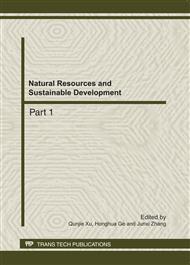p.639
p.644
p.650
p.655
p.663
p.671
p.676
p.683
p.687
An Analysis of Sustainable Development Based on a Comparison of the Pre- and Post-Disaster Biocapacity and Ecological Footprint in Zhouqu County,China
Abstract:
Zhouqu County is not only an impoverished area but also a poor environment region. Frequent occurrence of geological disasters in Zhouqu, which largely determines the quality of ecological environment, affects the regional sustainable development. In this paper, on a case study of Chengguan Town of Zhouqu, two TM images acquired in pre- (2008)and post-disaster(2010) were selected to conduct the research, using remote sensing and GIS spatial analysis techniques. The state of the ecological environment and sustainable development of the region were evaluated by using the ecological footprint methodology. The results show: Firstly, the biocapacity of built-up area and cropland are reduced by 318.50gha and 82.78gha after debris flow disaster respectively, followed by forest land, grazing ground, fishing ground and barren ground, which has played a serious impediment in economic development; Secondly, the ecological deficit reaches to -0.9245gha/per-cap before disaster, however, it reduces to -1.0691gha/per-cap after disaster. This indicates that Chengguan Town is not sustainable development, after sudden disaster, the situation of unsustainable development becomes more serious; Thirdly, it is found that debris flow and landslides are mainly not only in forest land and cropland, also areas containing many people and buildings, which shows geological disasters has played a significant impact on the socio-economic development. Finally, this article provides scientific references for the restoring of ecological environment as well as scientific disaster relief after the debris flow disaster. Therefore, strengthening management and mitigation techniques of disaster is benefit to humans and socio-economic sustainable development.
Info:
Periodical:
Pages:
663-670
Citation:
Online since:
October 2011
Authors:
Price:
Сopyright:
© 2012 Trans Tech Publications Ltd. All Rights Reserved
Share:
Citation:


